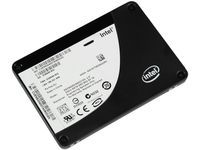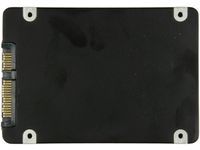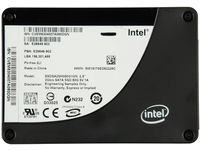Intel's X25-M Solid State Drive Reviewed
Intel X25-M SSD: Better by Design?

Here it is, the new X25-M; the name sounds very much like an experimental hypersonic plane. And the analogy isn’t far off, since the new flash SSD provides excellent performance. Intel even titled one of its presentation slides “better by design," which is in fact true for all of the new flash SSDs.
We already mentioned that Intel intends to deliver 250 MB/s of sequential read throughput. While we didn’t see this bandwidth on either of our two different systems, we did measure a constant throughput of roughly 200 MB/s for read operations and more than 70 MB/s for write operations. The transfer diagram (see benchmark section) shows that this throughput is maintained throughout the entire capacity of the unit.
Quantum Leap In Performance?

We double-checked our benchmarks carefully knowing that this product is based on MLC flash memory, which typically shows mediocre application performance and even poor I/O performance. But we weren’t disappointed this time around: the 0.085 ms access time (that’s 85 microseconds) stated by Intel is likely true, as our benchmarks only go down to 0.1 ms. I/O performance, however, was the real eye opener. The X25-M provides at least three times more I/O operations per second for database operations, at least twice the performance for file server scenarios, equal performance for Web server requirements and double the I/O operations per seconds for workstation applications. This all relates to the performance shown by the Samsung 64 GB SSD SATA-2. In an ideal case, which means low command queue depths, the Intel drive is 9x faster for databases, 3x faster for file servers, 20% faster in Web servers and gives 2.5x performance for workstations.

While throughput and I/O performance are frankly incredible when compared with traditional hard drives, and at least much faster in comparison with Samsung’s SLC-flash based 64 GB SATA-2 drive, the X25-M still isn’t perfect. The PCMark 05 HDD benchmark, which is a good tool to evaluate real-life throughput, confirms the stunning performance in the Windows XP startup benchmark. It is more than twice as fast as the Samsung drive, and more than 13 times faster than a Seagate Momentus 7200.3 2.5” notebook hard drive, which is considered state-of-the-art today. File writes, however, are quicker on the Seagate drive and Samsung’s 64 GB SATA-2 Flash SSD, as these are limited by the 74 MB/s write throughput. Look at the benchmark section to find more results on power consumption and performance per watt in workstation and streaming read workloads, as well as DVD playback power consumption.
Stay on the Cutting Edge
Join the experts who read Tom's Hardware for the inside track on enthusiast PC tech news — and have for over 25 years. We'll send breaking news and in-depth reviews of CPUs, GPUs, AI, maker hardware and more straight to your inbox.
Current page: Intel X25-M SSD: Better by Design?
Prev Page Intel’s SSD Plans Next Page Inside the X25-M SSD: 10-Channel FlashMost Popular

